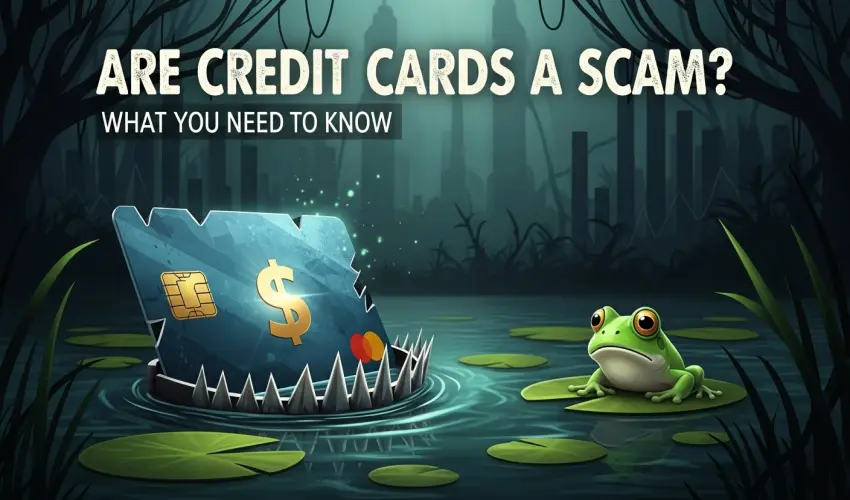Are Credit Cards a Scam? What You Need to Know
Published Jan 30, 2025
1 0
Key Takeaways
-
Credit cards aren't outright scams, but they are designed to profit from users’ mistakes through interest, fees, and behavioral psychology.
-
The illusion of “free money” and the minimum payment trap can lead to long-term debt cycles.
-
Emotional spending, marketing tactics, and ease of use make overspending dangerously easy.
-
Responsible users who pay their balance in full every month can benefit from rewards, credit building, and fraud protection.
-
Vulnerable groups like young adults or low-income households face the highest risk of financial harm.
-
Understanding how credit cards work and using them mindfully is the key to avoiding the debt trap.
Introduction
Credit cards: sleek, shiny symbols of financial freedom, or modern traps wrapped in convenience? To some, they’re indispensable tools for building credit and managing expenses. To others, they’re debt magnets engineered by banks to keep you paying forever. So, are credit cards truly a scam? Or are they simply misunderstood?
In this deep dive, we’ll explore the mechanics behind credit cards, the psychology they exploit, the systems they support, and the real risks and rewards of swiping plastic. Whether you’re a frequent user or a cautious skeptic, this article will help you understand what credit cards really are—and how to use them without being used.
1. The Business of Credit: How Credit Card Companies Make Money
To understand if credit cards are a scam, you first need to understand their business model. Credit card companies make money in several ways:
a. Interest Charges
This is the big one. When you carry a balance from one month to the next, you're charged interest—often at a high annual rate between 15% and 25%. This means a $1,000 unpaid bill could cost you hundreds more in interest over time.
b. Fees
The fees can add up quickly and include:
-
Annual fees
-
Late payment fees
-
Foreign transaction fees
-
Balance transfer fees
Many users don’t realize how much they’re paying in fees until it’s too late.
c. Merchant Fees
Every time you swipe your card, the merchant pays a fee of 1-3% to the credit card company. While this doesn't directly affect you at the checkout, it contributes to higher prices for goods and services for everyone.
In essence, credit card companies profit most when people don’t pay their balance in full, pay late, or are lured into debt by chasing rewards.
2. The Psychology Behind Credit Card Use
Credit cards don’t just offer credit; they play on your brain’s weaknesses. Here’s how:
a. The Illusion of Free Money & Delayed Consequences
Credit cards don’t feel like real money. When you spend cash, you physically see it leave your hand. With a card, it's an abstract number on a screen. This psychological disconnect makes it easier to overspend because you don’t feel the financial "pain" until weeks later when the bill arrives.
b. Reward Psychology
Like slot machines, credit cards use point systems, cashback, and exclusive perks to activate the reward centers in your brain. You feel like you're "winning" or getting a deal, even if you end up spending more to earn those rewards.
c. The Anchoring Effect
Promotional offers like “0% APR for 12 months” anchor you into believing you’re making a wise choice. However, if you don't pay off the balance before the promotional period ends, you can be hit with high-interest charges.
3. Are Credit Cards Predatory by Design?
While credit cards are legal and their terms are disclosed (in the fine print), their design can be exploitative, especially toward uninformed users.
The Minimum Payment Trap
Credit cards only require you to pay a small percentage (often 2–3%) of your balance each month. This makes it tempting to pay the minimum, but doing so can trap you in a long-term debt cycle where you pay interest for years while barely touching the original principal amount.
Compound Interest
Your debt grows rapidly because interest is often compounded daily. Even a small balance can balloon into a significant debt if left unchecked.
So, while credit cards aren’t illegal scams, they are profit-driven tools that are designed to benefit from your financial mistakes.
4. The Benefits of Credit Cards (When Used Responsibly)
Despite their downsides, credit cards are not inherently evil. When used wisely, they offer real benefits:
-
Credit Building: Responsible use builds your credit score, which is vital for securing loans, mortgages, and even some job applications.
-
Fraud Protection: Credit cards offer robust fraud protection, meaning you are not typically liable for unauthorized charges. This is a significant advantage over debit cards.
-
Emergency Access: In a crisis, a credit card can be an essential financial backup.
-
Rewards & Perks: Cashback, travel points, and extended warranties can offer real value—but only if you pay your balance in full every month and never pay interest.
5. Who Gets Hurt the Most?
The credit card debt trap disproportionately affects:
-
Young adults and students who may lack financial literacy.
-
Low-income households who often use credit cards for necessities, not luxuries.
-
People in crisis who rely on credit during emergencies, only to find themselves drowning in high-interest debt later.
This imbalance has led many to argue that credit cards are systemically predatory, benefiting the wealthy while harming the financially vulnerable.
6. How to Use Credit Cards Without Getting Scammed
If you choose to use credit cards, use them strategically to make them work for you, not against you:
-
Pay your balance in full each month. This is the golden rule.
-
Never rely on minimum payments. Always pay as much as you can.
-
Avoid cash advances. They come with extremely high fees and interest rates.
-
Know your interest rates and fees. Read the fine print.
-
Set up alerts to track your spending and payment due dates.
-
Treat it like a debit card, not a loan. Don't spend money you don't have.
A credit card should be a financial tool, not a financial crutch.
Conclusion: So, Are Credit Cards a Scam?
The answer lies in how you use them.
Credit cards aren’t technically a scam, but they are part of a system designed to profit from your mistakes, delays, and emotions. If used mindfully and responsibly, they can be beneficial, even empowering. However, if approached carelessly, they can quickly become financial traps that drain your wealth and peace of mind.
In truth, credit cards are neutral tools in a system that favors lenders over borrowers. Understanding the rules, the risks, and your own behavior is the only way to win at the credit card game.
So the next time you swipe, ask yourself: Is this card working for me, or am I working for it?








